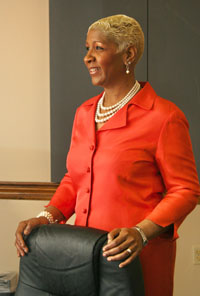


|
|
|
|
|
|
|
|
|
|
|
|
||||||||||||||
|
||||||||||||||
|
|
||||||||||||||
|
||||||||||||||
|
Posted 8/1/2008 Young adults, older black women are fastest growing segments
The TV camera's eye could not make the righteousness of Bambi Gaddist's cause any clearer. "I decided to become an AIDS activist because it was killing people, and I wanted to do something about it," she declares, chin set firmly. The camera belongs to CNN, which has been following Gaddist for one in a series of video reports on "CNN Heroes." The network describes "CNN Heroes" as ordinary people who accomplish extraordinary deeds in areas ranging from the environment to civil rights. Culminating in a year-end awards gala, the network will honor the most outstanding of viewer-submitted nominees from around the world. (Click here for links to a story and video features on Gaddist and her efforts) Among those who will be cheering her at that event are faculty, staff and students of USC's Arnold School of Public Health. Before it was renamed, Gaddist earned her doctorate from the former Department of Health Promotion and Education at the USC School of Public Health. Gaddist was nominated as a "CNN Hero" because of her extraordinary efforts on behalf of South Carolinians threatened with HIV/AIDS. That is a daunting task, says Gaddist. "South Carolina currently ranks ninth in the nation in the rate of AIDS. African-Americans make up 73 per cent of all of the cases although we make up only 30 percent of the population as a whole," she said. Thirteen years ago, Gaddist helped start and direct the South Carolina HIV/AIDS Council, a non-profit group that has given free HIV tests to more than 8.600 persons. The council operates a mobile test facility that Gaddist is willing to take "anywhere it needs to go." That includes venues ranging from nightclubs – both gay and straight – to churchyards. Gaddist says her council pioneered the concept of alternative,
non-government supported HIV/AIDS testing. It remains the council's
"anchor service." "We started it in the back of my house," she said. With $25,000 in seed money from Bristol-Myers Squibb, Gaddist' small group was able to become trained and obtain kits with which to start testing. Gaddist also works with a network of about 30 churches that have embraced health and wellness as part of their mission. Project F.A.I.T.H. (Fostering AIDS Initiatives that Heal) is an innovative faith-based initiative funded through the South Carolina Legislature. One of the two CNN segments shows a service at Springhill AME Church in Gilbert where Pastor Robert L. China Jr. preaches an HIV/AIDS awareness sermon. Spring Hill is a one Project F.A.I.T.H recipient. With the mobile lab set up outside, China sets an example by getting tested himself. The camera follows Gaddist and her volunteers as they visit with parishioners, preaching their own HIV/AIDS gospel of testing and awareness. Tables display a variety of condoms along with brochures. Gaddist said the CNN recognition could not have come at a better time. Like many non-profit groups, her HIV/AIDS council is feeling the pinch from the economic downturn. The council has been supported for the past five years by a Centers for Disease Control grant. However, that grant runs out next year. The organization will have to reapply for funding in a highly competitive environment marked by government stinginess and scant private philanthropy. "I'll be honest, we need some help. It's really been difficult. Maybe this will be an avenue so people will see us in a different way," she said. Gaddist said the HIV/AIDS threat continues to grow. The number of cases in South Carolina averages between 15,000-16,000 persons who have been tested. Gaddist suspects the number is higher because people are reluctant to be tested and the medical establishment does not pursue detection aggressively. The fastest growing two groups are young persons, aged 20-24 and black women, age 45 and up, she said. "About 42 percent of our cases are actually heterosexual. This runs against what many believe – that this is a predominately gay problem," she said. A New Jersey native, Gaddist came south to study physical education and health at Tuskegee University. Later she earned her master's degree in physical education administration/health from Indiana University. She specialized in human sexuality and family life education during her doctoral studies at USC. Her mentor and advisor at that time was the late Dr. Murray Vincent, a nationally recognized expert in teen pregnancy prevention. She worked for S.C. State University and the S.C. Department of Education before helping establish the HIV/AIDS council. She is married to Bernard Gaddist. They have a 27-year-old daughter, Kialeah Sumpter, who is a MSW graduate of USC. She also works in the HIV/AIDS field. Two grandsons, Nyheme, 10, and Chase, eight months, round out the family. She attends Brookland Baptist Church in West Columbia. Besides being her spiritual home, Brookland was one of the first churches to participate in the HIV/AIDS Council's efforts by making a financial gift to the program. |
| Columbia, SC 29208 • 803-777-7000 • sphweb@gwm.sc.edu | © University of South Carolina Board of Trustees |
